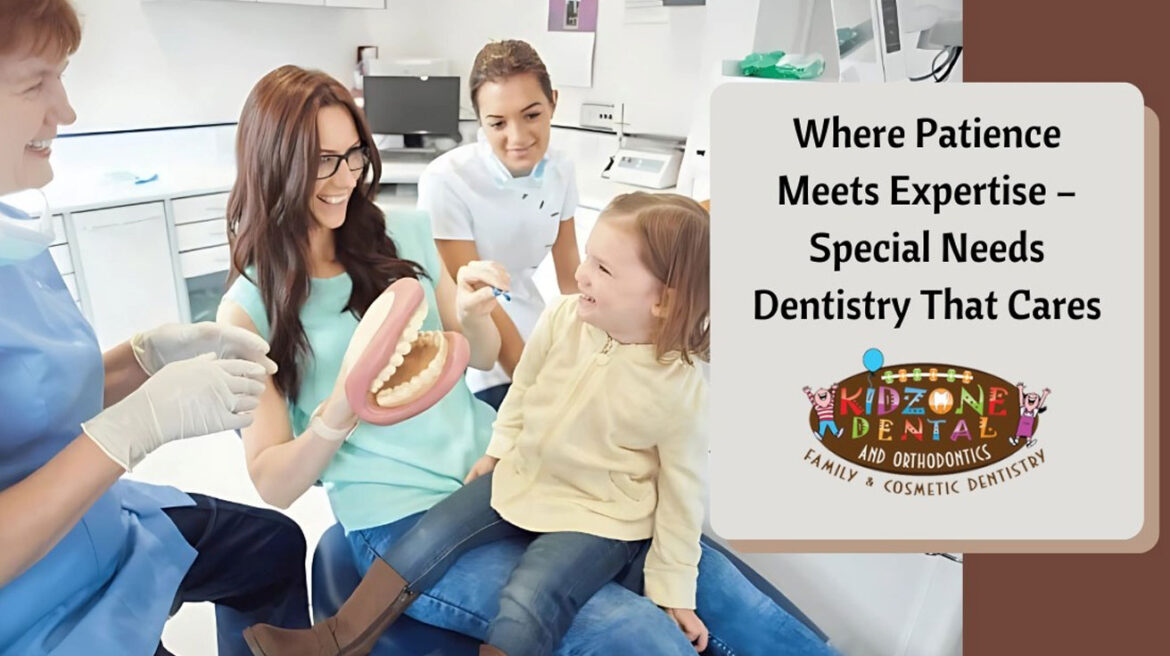Where Patience Meets Expertise – Special Needs Dentistry That Cares
Caring for a child’s dental health requires patience and expertise, but when it comes to children with special needs, these qualities become even more essential. Special needs dentistry focuses on providing compassionate, customized dental care for children with physical, developmental, sensory, or emotional conditions. A visit to the dentist can be overwhelming for many children, but with the right approach, it can be a comfortable and positive experience.
From autism and Down syndrome to sensory processing disorders and anxiety, children with special needs require extra attention and specialized techniques to ensure their dental health is maintained without distress. Pediatric dentists who specialize in special needs care create a welcoming environment where children and their families feel supported, understood, and confident in their oral health journey.
What Is Special Needs Pediatric Dentistry?
Special needs pediatric dentistry focuses on treating children with unique challenges that require extra attention and care. These may include:

Autism Spectrum Disorder (ASD) – Children with autism may have sensory sensitivities that make dental visits overwhelming.
Down Syndrome – Kids with Down syndrome often have specific dental concerns, such as delayed tooth eruption or a higher risk of gum disease.
Cerebral Palsy – Muscle control issues can make oral hygiene difficult, increasing the risk of cavities and infections.
ADHD and Anxiety Disorders – Difficulty sitting still or heightened anxiety can make dental visits stressful.
Sensory Processing Disorders – Bright lights, loud sounds, and dental tools can be overwhelming for some children.
Other Developmental or Medical Conditions – Any condition that makes it difficult for a child to receive routine dental care falls under special needs dentistry.
A special needs pediatric dentist is trained to work with these challenges and provide a positive experience for both the child and their family.
Common Challenges for Children with Special Needs in Dentistry
Children with special needs often face obstacles when it comes to receiving dental care. Some common challenges include:
1. Sensory Sensitivities: The bright lights, unfamiliar textures, and buzzing sounds of a dental office can be overwhelming for children with autism or sensory processing disorders. Even the feeling of a toothbrush or dental instrument may cause discomfort.
2. Difficulty Communicating Pain or Discomfort: Some children may struggle to express pain, fear, or discomfort, making it challenging for parents and dentists to understand their needs.
3. Fear and Anxiety: Past negative experiences or a general fear of doctors and medical settings can make dental visits distressing for children.
4. Mobility and Physical Limitations: Children with cerebral palsy or other physical disabilities may require special accommodations, such as wheelchair-accessible dental chairs and additional support during treatment.
5. Difficulty Maintaining Oral Hygiene at Home: Certain conditions can make brushing and flossing difficult, leading to a higher risk of cavities and gum disease.
How Special Needs Pediatric Dentists Provide Exceptional Care
Special needs pediatric dentists use specialized techniques to create a stress-free, positive experience. Here’s how they help children feel comfortable and safe:
1. A Gentle and Patient Approach: Special needs dentists take their time, allowing children to adjust gradually. They use calm voices, gentle movements, and reassuring words to create a trusting relationship.
2. Sensory-Friendly Accommodations: Many pediatric dental offices offer dimmable lights, noise-canceling headphones, weighted blankets, and private treatment rooms to help reduce sensory overload.
3. Visual and Social Storytelling: Some children benefit from seeing visual schedules or reading social stories before their appointment. These tools help them understand what to expect, reducing anxiety.

4. Sedation Dentistry When Needed: For children who experience severe anxiety or difficulty sitting still, sedation options such as nitrous oxide (laughing gas), oral sedation, or IV sedation can make the experience easier and more comfortable.
5. Positive Reinforcement: Praise, small rewards, and encouragement help children associate dental visits with positive experiences, reinforcing good behavior for future visits.
6. Parent and Caregiver Involvement: Dentists work closely with parents and caregivers to develop at-home oral care routines and strategies tailored to the child’s specific needs.
The Benefits of Special Needs Pediatric Dentistry
Choosing a pediatric dentist who specializes in special needs care offers several benefits, including:
- Healthier Teeth and Gums – Regular checkups help prevent cavities, gum disease, and other dental issues.
- Reduced Dental Anxiety – A patient and gentle approach helps children feel more comfortable at the dentist.
- Customized Preventive Care – Special needs dentists provide individualized recommendations to maintain oral health.
- Improved Overall Well-Being – Good dental care is linked to overall health and can prevent future complications.
- Confidence and Comfort – Positive experiences encourage lifelong dental health habits.
How to Find the Right Special Needs Pediatric Dentist
Finding a dentist who understands your child’s unique needs can make all the difference. Here’s how to find the best fit:
1. Look for Specialized Training: Choose a dentist with experience in special needs pediatric dentistry. Many pediatric dentists receive additional training in working with children with disabilities.
2. Visit the Office Before the First Appointment: Scheduling a pre-visit allows your child to meet the staff, see the office, and become familiar with the environment before treatment begins.
3. Ask About Accommodations: Check if the dental office offers sensory-friendly rooms, sedation options, or other modifications to enhance comfort.
4. Read Reviews and Get Recommendations: Ask other parents, caregivers, or support groups for recommendations on dentists who specialize in working with children with special needs.
5. Communicate Your Child’s Needs: Let the dental team know about any sensory sensitivities, behavioral triggers, or special accommodations your child may need to ensure a smooth experience.
Where patience meets expertise, special needs pediatric dentistry shines. Every child deserves a healthy smile and a dental experience that is stress-free, positive, and tailored to their unique needs. With a compassionate approach, specialized training, and a commitment to gentle care, special needs pediatric dentists help children build confidence and maintain lifelong oral health.
If you are looking for a dentist who truly understands and cares for children with special needs, take the time to find a trusted provider. With the right dental team, visits can become a comfortable and even enjoyable part of your child’s healthcare journey.








